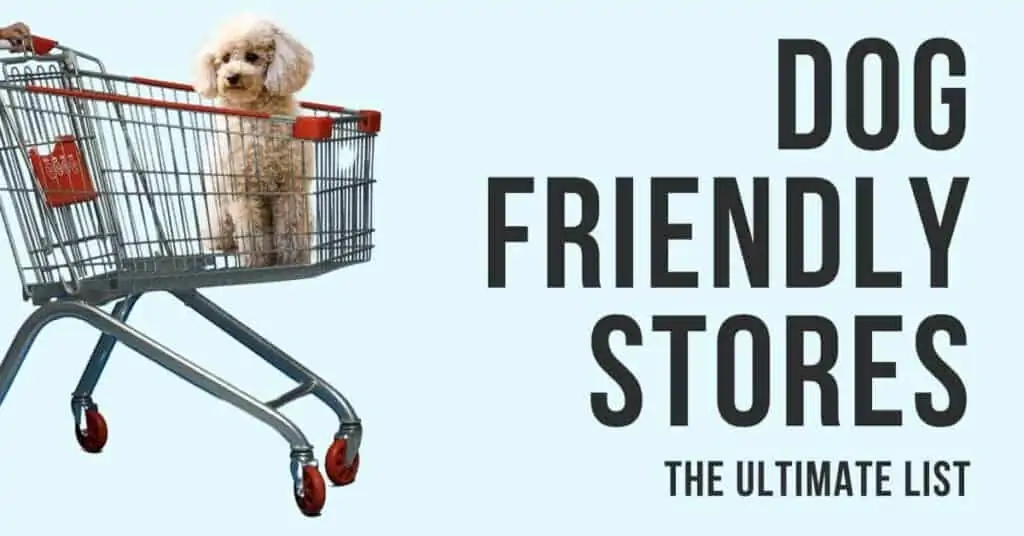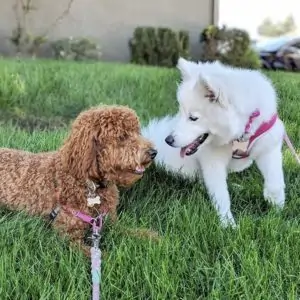
Learning how to socialize a puppy is one of the most critical aspects of being a new dog owner but also one of the most misunderstood and overlooked. Socialization is all about helping your new puppy grow accustomed to the various sights, smells, and sounds of the world in a positive manner. It also helps your new friend be a safe and happy member of society that gets along with both people and other animals.
We’ll talk more about all the reasons why learning how to socialize a puppy is important in a bit. However, the biggest takeaway is this: all responsible dog owners MUST thoroughly socialize their puppy. Doing so doesn’t have to be complicated and can easily be a fun process for both you and your furry companion! Let’s dive in and learn more!
Why Learn How to Socialize a Puppy
Socializing your puppy is the single most important thing you can do as a new dog owner. Proper puppy socialization will help develop your dog into a happy, well-mannered companion. When socialization is procrastinated or neglected, puppies can easily develop lifelong behavioral issues. Instead of being excited for car rides, children, or new dog friends, an improperly socialized dog will be fearful and as a result could act aggressively.
In addition to being inconvenient for everyone involved, the behavioral issues caused by improper socialization could be deadly. According to the American Veterinary Society of Animal Behavior, behavioral issues, not infectious diseases are the number one cause of death for dogs three years old or younger. Yes, properly socializing your puppy can save its life!
Even if not taken to the extreme of death, the amount of dogs given up due to completely preventable behavioral issues is heartbreaking. And if your dog ever becomes lost, being comfortable in a variety of situations and without fear or aggression will drastically increase the likelihood of a safe return home.
These facts aren’t here to scare you, but rather to motivate you. Owning a dog is a huge responsibility and the pet parents who take socialization seriously will be rewarded with many years of a happy and well-behaved best friend.
What Age to Socialize a Puppy
How early should you socialize a puppy? A good, reputable breeder will start the socialization process as early as the first week of a puppy’s life. Gently handling the puppies, letting them play amongst their littermates, and having them explore their surroundings all result in a great head-start to the socialization process.
Where you as a new dog owner come in is during the critical socialization period. This timeframe, from 7 weeks to 4 months of age, is when your puppy’s personality and behavior is permanently shaped by their environment and experiences. It is critical that you use this period effectively, as once the door closes it is closed forever. While improvements in socialization are possible at any age, it will never again be this easy and some negative behavioral issues may be permanent.
The moral of the story is this: if you don’t have time to dedicate to successfully socializing your dog between 7 weeks and 4 months of age, it is NOT the right time for you to get a puppy.
How to Socialize a Puppy Before Vaccinations
The biggest question mark around this process is how puppy socialization is affected by their vaccination schedule. Most puppies aren’t fully vaccinated and protected until 16 weeks of age, at which point the critical socialization period has already ended. How do we as new dog owners manage this apparent dilemma? To make matters worse, new puppy parents (with all the best intentions) get overly scared by their veterinarian as to the dangers of parvovirus and other diseases. Veterinarians are simply doing their job to keep your dog healthy. It’s up to you to balance that need with the need for socialization.
With that being said, socialization should NOT be put off until after vaccinations are complete. As mentioned earlier, while the dangers of parvovirus and other diseases are real, the dangers of under-socialization are just as real and far more likely to occur. This doesn’t mean you should immediately take your new pup to the dog park. However, there are very safe options for socialization which can be started even before your puppy’s first round of vaccinations. Let’s explore the possibilities!
How to Socialize a Puppy Before Vaccinations
In Your House
If your puppy can’t quite be out in public yet, bring the new experiences to them! Invite family and friends over to gently handle, feed, and play with your pup. Always remember to ask guests to take their shoes off before entering so no potentially harmful bacteria is tracked inside.
In Your Yard
As long as your yard isn’t home to lots of wildlife who could potentially be leaving feces, this is likely another safe place for you and your new puppy to interact and explore. Playing recall games and exposing your dog to new types of people are great ideas.
In Your Car
Taking quick rides around the block will be great practice for getting your dog acclimated to car rides and less prone to getting sick.
Baby Style
You shouldn’t be taking your puppy for normal walks at this point! However, using a dog stroller or puppy sling can help you still go for short walks together. This will get a head-start in exposing your puppy to new sights, sounds, smells, and people without the dangers of walking in public or greeting other dogs yet.
How to Socialize a Puppy After First Round of Vaccinations (6-8 Weeks)
Play Dates
Invite over friends’ healthy, vaccinated, and well-behaved dogs. Even better, go to their house for a new environment!
Regular Walks
Now is the time you can start regularly walking your puppy! The only caveats are that you should avoid areas that are trafficked by lots of dogs and be extra careful to avoid your dog coming into contact with feces of any kind. Some common places to avoid are parks, hiking trails, pet stores, etc. Make sure to check with owners of any dogs you pass to make sure they are healthy and fully vaccinated before allowing your puppy to greet them.
New Places
Now is the time to start taking your dog to new places, meeting new people, and getting the bulk of your socialization in. As long as there aren’t dogs or animals of questionable health there, you’re likely good to go! Be careful, but err on the side of socialization.
Puppy Socialization Classes
This is a great way for you and your pet to meet other healthy, vaccinated puppies. Great class providers will make sure the area is clean and safe.
How to Socialize a Puppy 7-10 Days After All Vaccinations
Dog Park
Now is when you can finally bring your pal to romp off-leash with other dogs! Be sure to watch carefully and expose him gradually to ensure a positive experience.
Pet Stores
Another great place to meet a variety of new animal friends and smells. Plus, nothing beats free treats from the cashier!
Related: The Ultimate Dog Friendly Stores List: 38 Well-Known Stores That Allow Dogs (With Proof!)
Veterinarian’s Office
An important but underutilized place for socialization. Not only do you get the opportunity to meet a variety of animals, but it makes the vet a positive experience for your dog, not just a place they go to for shots!
Related: Veterinarians Weigh In: Should You Get Pet Insurance?
Keeping the Experience Positive
Successful puppy socialization is contingent on it being a positive experience for everyone involved. Ample amounts of praise and treats are helpful as your puppy becomes more and more confident in new situations and surroundings.
It’s also important to remember that this is a process and dogs shouldn’t be rushed into situations where they’re uncomfortable. Baby steps! For example, if you’re looking for your puppy to get comfortable getting handled and pet by new people, start with one or two friends at a time, not everybody at once. Similarly, be conscious of your surroundings. A young puppy’s first outside socialization experience shouldn’t be at your kid’s soccer game where they’ll be lots of loud noises, energy-filled children running around, and tons of strangers looking to give your dog attention. Start slowly and gradually build upon positive results.
Keep an eye out for signs of stress or fear from your dog such as excessive yawning, panting, and their tail between their legs. Whatever is causing that it’s important to give your puppy a chance to relax and revisit that fear slowly and positively. Never force your dog when they’re uncomfortable to “get over” the situation. Always act compassionately and positively!
Finally, remember that dogs are great at sensing our emotions too and can base their reactions on them! So while it may be nerve-wracking seeing your small puppy play with a large dog for the first time, do your best to stay relaxed and enjoy the experience so your dog does the same.
Puppy Socialization Checklist
People
Infants, toddlers, older kids, teenagers, adults, elderly people, men, women, people with long hair, people with beards, people of different ethnicities, tall people, heavy people, people wearing hats/hoods/glasses/sunglasses/backpacks/helmets/masks, people in uniforms, people with canes/crutches/wheelchairs, drunk people, loud people, delivery people, repair people, people with strollers/wagons.
Animals
Dogs, cats, squirrels, deer, birds, horses, and/or any other animals your dog may come into contact with on a regular basis.
Things That Move
Bicycles, skateboards, emergency vehicle sirens, running kids, motorcycles, boats, cars, trucks, trains, running animals, busses, people dancing, lawn mowers, vacuum cleaners.
New Places
Cars, beaches, parks, stores, veterinarian’s office, hiking trails, other people’s houses, large noisy crowds, near washing machines and dryers, by construction, by fireworks, urban environments.
Surfaces
Grass, gravel, mud, pavement, carpet, wood flooring, tile, wet surfaces, the bathtub, mulch, sand, manhole covers, grates, icy surfaces, stairs, elevators, sidewalks.
Elements
Rain, snow, wind, heat, darkness, thunder.
Handling
Petting, hugging, kissing, poking, touching their ears, touching their tail, touching their paws, taking things away from them, taking their food, grooming.
A Lifelong Adventure
While the critical socialization period between 7 weeks and 4 months is when you should make a daily habit of checking off as many of the new experiences listed above as possible, puppy socialization does’t stop there! Socialization is a lifelong process that should constantly be improved upon and practiced. Luckily for both you and your four-legged pal, it doesn’t have to be a chore! Going on new adventures with your dog are some of the best memories you’ll have together and something you will both cherish for the rest of your lives.




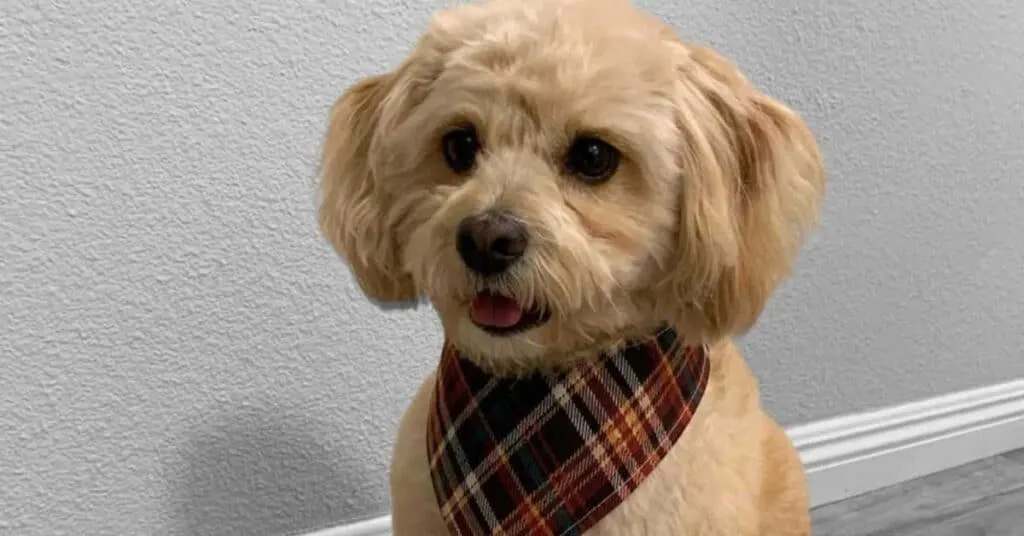
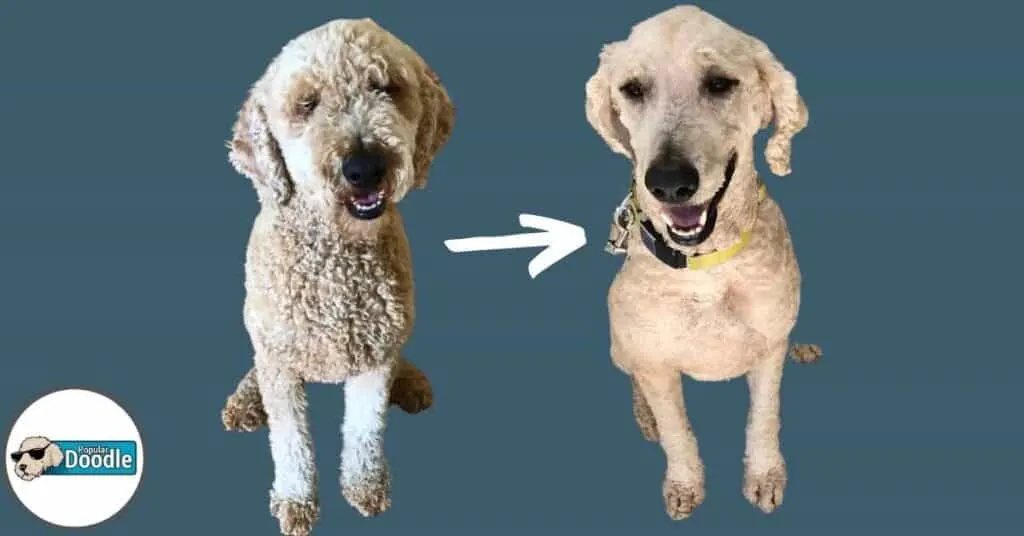
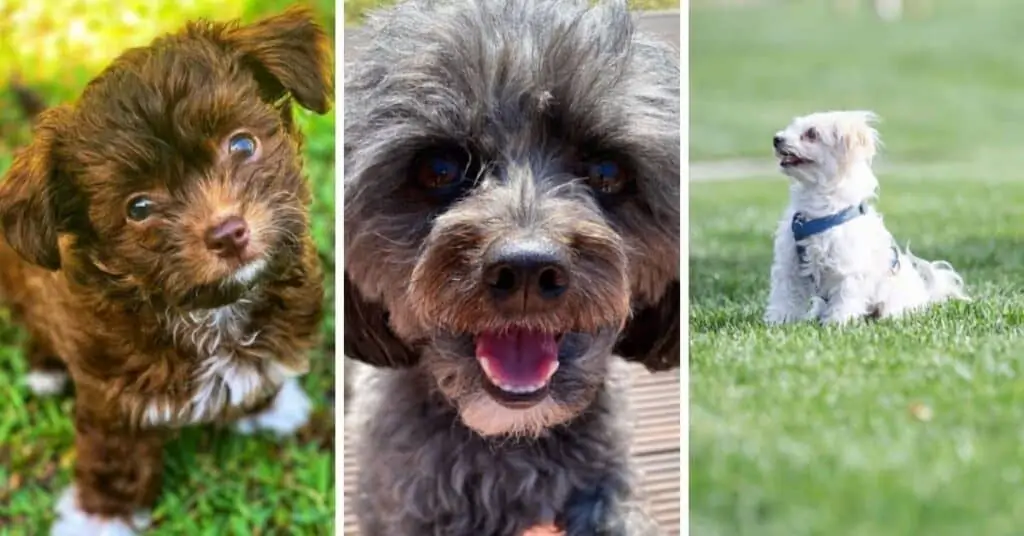
![What is a Sable Goldendoodle? [Photo Gallery & FAQs] what-is-a-sable-goldendoodle](https://populardoodle.com/wp-content/uploads/2021/11/what-is-a-sable-goldendoodle-1024x536.jpg.webp)
